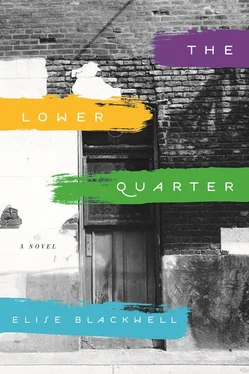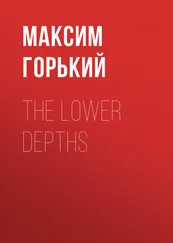Her place was dark when she got home, and she felt the prick of small disappointment. Usually she kept her bicycle inside, but since Henry had moved in she’d taken to locking it to the front stair railing to give them a little more interior space. She was risking theft, but her bike wasn’t worth much, and she’d sprung for a good lock.
She decided she’d work for an hour to see if Henry showed up and then go eat either way. Her growing tattoo had inspired a shift in her work, and she was sketching for a painting more stylized than anything she’d done before. Still Biloxi but cleaner in its lines and more exaggerated. One day soon, she thought, maybe after she finished this one, she was going to turn her attention to New Orleans. The trick was to find a new way to depict such well-trodden territory, to see the city in different colors. Or maybe she could make it new because it was new — no longer that place it had been before.
When she heard people in front of her house, she was about half an hour into a sketch of a particular block of beachfront Biloxi before it was leveled. Telling herself a secondhand bicycle wasn’t worth getting shot over, she peeked out her front window through the split in her curtains. What she saw wasn’t a thief but a woman and small girl bringing a cat carrier and a large box into the house across the street.
Marion stepped out. When the woman gazed at her, she felt self-conscious. “Need any help?” seemed like the best response.
“We got it,” the woman said and turned back to the house, which looked undamaged by the storm but long in need of fresh paint. It had been blue once, perhaps a turquoise now diluted by the bare wood emerging through the paint. “You didn’t live here before,” she said over her shoulder.
Marion shook her head in agreement. “The place I use to live is no more.”
The woman faced her again, hip popped out to one side. “You and a lot of people. Next thing you’ll be telling me is that white kids are moving into the Desire Projects.”
Marion laughed a little because the woman’s face was softer than her words. “I don’t think that’s happening anytime soon.”
The little girl took the cat from the woman and disappeared inside, but the woman stayed out front. “I thought my house would be worth even less now than it was before, but you make me think I got a chance of selling it.”
“I’m about the last person you should take advice from, real estate or otherwise.” Marion lingered, half expecting the woman to have some sage words for her, but she just made a small grunting sound and said, “I’ll keep that in mind.” She turned around again at her front steps and added, “And I guess I’ll be seeing you around.”
As soon as Marion walked through the kitchen, she realized that something was wrong with the third room, which she’d started calling, just to herself, the studio instead of the bedroom. What she wasn’t sure of was whether the composition had changed in the few minutes she was outside or whether she just hadn’t noticed when she’d got home from work because she had been mired in her thoughts.
Regardless of when it had been taken, the knowledge that the architect’s bag was gone lodged in her esophagus. She’d looked into the bag within minutes of Clay’s departure — perhaps curiosity is the simplest human impulse, even if its consequences are so often messy — and so she knew that it contained a small and expertly done painting. It was the kind of painting people pay real money for, though from what she could make out of the signature, she had never heard of the artist. While it was possible that Clay had got her in over her head, she settled on the more likely conclusion. She had been failed by Henry, and as a result she would fail Clay and Johanna. To trust another was to be made untrustworthy yourself. She was a victim of both her own stupidity and the paltriness of her origins.
She was rocking herself on the floor, arms around her bent legs, when she heard Henry come in. Though she’d turned off all the lights, he walked straight through the house and stood near her.
“I’ve got to tell you something,” he said. “I’ve done something I’m not sure I can fix.”
Marion cradled her knees harder. “No kidding. Why did you come back?”
“To try to fix it, or at the very least to give you the money.”
“You sold it?”
“I was going to buy, but I worked my tools and I want to stay clean. They taught us that it doesn’t have to be automatic, that you can stop the process by thinking about it. It’s not something I could have done a year ago, and I’m not sure it’s something I can even do tomorrow, so I want you to take the money and put it where I can’t get it. It’s important that you don’t trust me.”
Marion laughed and said that maybe they were biologically related after all. Though the envelope Henry handed her was fat with money, and money was what she most needed from the world to make a new life, she found herself calling Eddie with the idea of trying to close things right. She focused on the simple steps of doing this and allowed her positive impulse to remain as unexamined as her baser ones always had been.
Johanna
Every emotional hue but the strong one she could not name washed off her like sand when Elizam walked through her door. The light outside was bright but diffuse, and his face loomed dark before her, his features vivid and deep despite the backlighting. With her eyes she could recall the feel of his hair, which looked wiry but to the touch was thick and soft. She took in his eyes, his lips, his badly swollen nose.
She whispered the one ugly syllable: “Thief.”
“It wasn’t me,” he said. “I didn’t take your painting.”
What happened next surprised her: She believed him. “Why not?” she asked. “Why didn’t you?”
“Because I would never do anything to hurt you.”
“But what if you thought it was in my best interest to have the painting gone?” she asked.
“I wouldn’t make decisions for you. If I had believed you would be better off giving up the painting, I would have tried to talk you into it. I wouldn’t have just made it happen.” He bracketed her shoulders, moved his head to find direct eye contact.
“What if I was suicidal and asked you for a knife? Would you give that to me?”
“But you aren’t.”
She waited for him to say more, nodded in agreement when he did not. “But I need that painting. You are a thief. You can get it for me.”
Elizam was shaking his head before she finished. “I can’t.”
“You will not. You want to avoid prison and save me from myself and live happily ever after.”
He reached for her hair, but she pulled back.
“Repeat that to yourself, Johanna, and ask yourself if that’s a bad thing to want. But even so, I would do anything for you anyway. I would go to prison for you, right this moment. The thing is that I don’t think I can steal it. A matter of ability. To have a chance, I’d have to know exactly where it was. I would have to hire people, probably from out of town given that the connections seem to run deep and unpredictable around here.”
He went on talking, but she stopped following the details. After catching the brunt of his message, she was doing what he’d asked: repeating to herself the happy ending she had accused him of wanting. He was right: It was not such a bad thing to want.
They were interrupted by Marion and a man she’d seen on the block quite a bit lately. After Marion caught her breath, she told her story, which was as surprising to Johanna as anything that had happened since the storm: Clayton Fontenot had given her something to hold on to and then give to Johanna, but her junkie brother had fenced it before remembering that he was in recovery. He had repented too late.
Читать дальше












